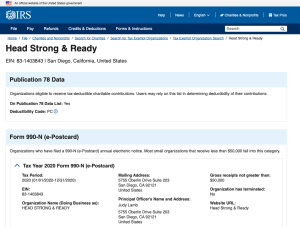Partner your business with HSR, deduct the donation, and then use our partnership in your marketing!
| Sponsorship Level | Diamond Sponsors | Platinum Sponsors | VIP Sponsors | Executive Sponsors |
|---|---|---|---|---|
| Donation | $10,000 within any 12 months | $5,000 within any 12 months OR Advertising space on your home page for 12 months |
$2,500 within any 12 months OR Advertising space on your home page for 6 months |
$1,000 within any 12 months OR Advertising space on your home page for 3 months |
| Marketing Partnership |
|
|
|
|
Why sponsor HSR?
90
oof consumers who would switch brands to support a cause
67
oof employees prefer to work at socially responsible corporations
Cone Communications, “2015 Cone Communications/Ebiquity Global CSR Study”
Donations are
tax-deductible
Enhance
customer
perception of
your brand
Attract and keep like-minded customers
A charitable component of your business or a specific product will make it stand out from others
Fundraising Goals Through 2028
Increasing Therapy Sessions
We are on track to provide 70% more therapy sessions in 2023 than we did in 2022. You can help us do even more in 2024 and beyond!
88,300
Expanding Services
We aim to expand services to veterans and family members in Texas by the end of 2024.
3,387
Hiring More Clinicians
We plan to hire two more clinicians by 2026 and a psychiatrist by 2028 to roughly double our current patient throughput.
232,013
HSR uses funds effectively
2022 HSR expenditures

2023 Year To Date HSR expenditures

There are a limited number of providers that take the military’s insurance (TRICARE). Why?
- High administrative burden
- There is a significantly higher administrative burden associated with TRICARE patients. TRICARE authorizations typically expire sooner than most other primary care referral authorizations, so the provider must seek an updated authorization more frequently. HSR accounts for this administrative cost in its operations.
- Unfamiliarity with military culture
- The military has a unique sub-culture with its own language, unwritten rules, social hierarchies, and anachronisms (e.g. parking spots assigned by rank, removing hats indoors, off-duty dress codes) that are difficult for those not affiliated with the military to understand. It is easier for many mental health providers to simply choose not to see patients with a military background.
HSR is composed of military-affiliated professionals. We know the military and speaks its language! We are a part of the military culture and can connect with service members, veterans, and family members in a way that other service providers can not.
- The military has a unique sub-culture with its own language, unwritten rules, social hierarchies, and anachronisms (e.g. parking spots assigned by rank, removing hats indoors, off-duty dress codes) that are difficult for those not affiliated with the military to understand. It is easier for many mental health providers to simply choose not to see patients with a military background.
- TRICARE does not compensate for no-shows
- TRICARE does not compensate the service provider for a no-show patient. But the service provider still incurs administrative, overhead, and opportunity costs for a no-show patient. Hence many service providers either charge a no-show fee to the patient or simply refuse to accept TRICARE patients.
HSR accepts TRICARE patients and we do not charge them no-show fees. HSR recognizes the burdens that military life places on our patients and accommodates them in a way that others won’t. The ability to cancel or reschedule an appointment at the last minute is a way for HSR to afford some level of control to a population that has very little control over their personal lives.
- TRICARE does not compensate the service provider for a no-show patient. But the service provider still incurs administrative, overhead, and opportunity costs for a no-show patient. Hence many service providers either charge a no-show fee to the patient or simply refuse to accept TRICARE patients.
- Perceptions of military service members
- Perceptions of military members, veterans, and family members. Some service providers perceive military members through stereotypes. At HSR, we are vets and family members. WE TAKE CARE OF OUR OWN.
What HSR provides that the military sometimes can’t:
- One on one therapy
- Active duty members and veterans seeking mental health care on base or at the VA are sometimes assigned to group therapy due to limited resources. Obviously, privacy and the quality of care suffers as a result. At HSR, our patients receive one on one care every time.
- Therapy when & where it fits
- Troops are often too busy to fit therapy into their busy schedules, or their commands sometimes makes it difficult for them to schedule it. HSR therapists can meet with patients for short virtual therapy sessions, as short as 15 minutes. We can see them wherever they are located, such as on the flight deck of a ship, in the chow hall, or outside of their barracks.
- Military advisors
- HSR clinicians regularly consult with members of the board of directors in a HIPAA-compliant method for guidance on military matters that affect their patients. This advice is crucial because it comes from an unbiased source that is outside of the military member’s chain of command, and can help the patient navigate the unique medical, legal, and disciplinary processes that service members face. The board of directors consists of highly experienced veterans that have served as unit commanders and personnel supervisors.
- Continuity of care
- Building a relationship with a therapist over time builds trust and leads to better outcomes. Our clients receive care from the same therapist from start to finish. On base and at the VA, that is unlikely.
- Long term therapy
- The VA and other veteran-focused clinics generally limit clients to 7-15 sessions depending on the type of therapy. They generally do not provide long term therapy.





















